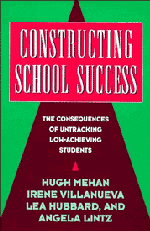Book contents
- Frontmatter
- Contents
- List of Figures and Tables
- Acknowledgments
- 1 Introduction
- 2 Tracking Untracking
- 3 Does Untracking Work?
- 4 Background Characteristics and College Enrollment
- 5 The Social Scaffolding Supporting Academic Placement
- 6 Organizational Processes Influencing Untracking
- 7 Peer Group Influences Supporting Untracking
- 8 Parents' Contributions to Untracked Students' Careers
- 9 Implications for Educational Practice
- 10 Implications for Theories Explaining Educational Inequality
- References
- Index
2 - Tracking Untracking
Published online by Cambridge University Press: 05 June 2012
- Frontmatter
- Contents
- List of Figures and Tables
- Acknowledgments
- 1 Introduction
- 2 Tracking Untracking
- 3 Does Untracking Work?
- 4 Background Characteristics and College Enrollment
- 5 The Social Scaffolding Supporting Academic Placement
- 6 Organizational Processes Influencing Untracking
- 7 Peer Group Influences Supporting Untracking
- 8 Parents' Contributions to Untracked Students' Careers
- 9 Implications for Educational Practice
- 10 Implications for Theories Explaining Educational Inequality
- References
- Index
Summary
We are attracted to untracking because of its potential. Untracking attacks the problem of students with varying educational experiences in a fundamentally different way than prevailing educational policy. Untracking attempts to replace the adulterated, watered-down curricular approaches associated with tracking with a policy that provides all students with a similar curriculum, while varying the amount of institutional support that students receive. Having contributed to the literature that has exposed the inequalities generated by such school sorting practices as tracking, ability grouping, and testing, we now feel it is time to work collaboratively with people who are attempting to achieve the goal of educational equity.
Because the first author's intellectual roots are grounded in ethnomethodology (Mehan & Wood, 1975), and he had to wrestle with the dilemmas and contradictions posed by the realization that one's participation in research transforms it, we are sympathetic to the issues concerning reflexivity in research raised by critical and feminist scholars (e.g., Behar, 1991; Lather, 1991) who entreat us to make the researcher's positionality itself a visible part of the research process. In so doing, Behar, Lather, and others do us a service by making the connections between the subjective and the objective poles of social research explicit.
But while we can wrestle with reflexivity, we cannot defeat it, because it is an essential feature of everyday life and social research. If we focus too intently on the researcher's contributions, emotional state, and ethical dilemmas, then we stand the chance of losing the very phenomenon we set out to investigate.
- Type
- Chapter
- Information
- Constructing School SuccessThe Consequences of Untracking Low Achieving Students, pp. 21 - 38Publisher: Cambridge University PressPrint publication year: 1996



